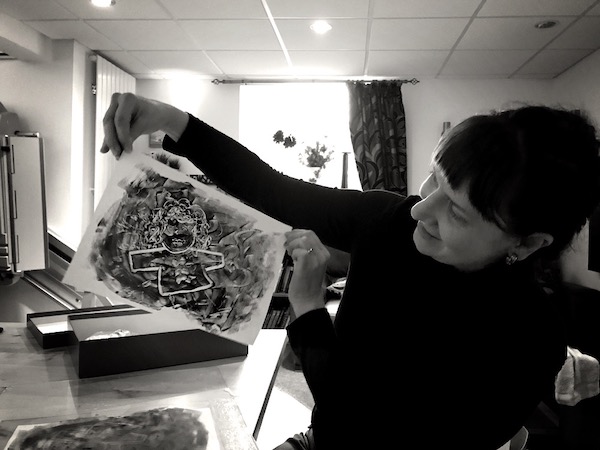To help you decide if you should be searching for an English language teacher or an English language coach, I will use examples of teaching and coaching in learning to draw and learning a language.
I use drawing as my analogy as many of our English learners have had Art and Design School training. This means they are familiar with gaining an initial set of creative skills and then developing them to express themselves with their own voice and expression.
Drawing also works as an analogy for learning English if we agree that achieving a kind of subconscious fluency is the goal in both.
I demonstrate that both teaching and coaching can not only make your journey quicker and sweeter – but also open your world to perspectives, ambitions and versions of yourself.
I do point out that there is a great deal of overlap between teaching and coaching and sometimes the differences are subtle.
I believe that a good English teacher furnishes you with many useful, practical skills for you to use when you need them.
I suggest that an English language coach aids you to grow an identity as an English speaker – even shapes the direction of your English-speaking journey.
Follow my analogies to work out for yourself, which training style you are ready for.

Gaining Basic Skills & Overcoming Reluctances
I have taught art for many years, hearing, ‘I can’t draw,’ or ‘I’m not creative’ often at social events when telling people what I do.
People say to me, ‘I couldn’t even draw the curtains’.
I interpret this as, ‘I’m not interested in drawing.‘ I mean, everyone COULD draw if they wanted to. They either fear failure at it or have zero interest in drawing as an activity.
If that person were their student, a teacher would give solid pointers as to where to start and how to improve, choosing exercises designed to produce small wins and build confidence.
If that person were their client, a coach would teach a similar drawing exercise, while also trying to discover the root of the person’s reluctance to take risks.
At this stage, the learner principally needs practical training. Arguably, the coach’s additional mindset work might keep them on the learning pathway for longer.
The Early Stages of Learning Require Lots of Practice
At primary school, I was puzzled when kids said to me, ‘I can’t draw horses’.
I would add my version of a horse to their fields (already full of cows and sheep and other four-legged creatures). (It was certainly no better than what they could have done if they hadn’t feared doing it).
At high school, I heard, ‘I can’t draw hands’.
(They still hopefully proffered their paper to me if the teacher wasn’t looking).
It puzzled me, this division of things that could and couldn’t be drawn. Why could someone draw a face but not a foot? A cow but not a horse?

It IS hard to get a hand that doesn’t look like a bunch of bananas, but my coaching conclusion says maybe it doesn’t matter if an exceptionally nice portrait has sketched out banana hands.
A conventional art teacher in a conventional system would mark it down. They have to. Assessment is based on failure. It’s not a ‘can do,’ system, it is ‘can’t do’.
Teaching can be about assessing what can’t be done – exposing gaps in knowledge to build on them.
Coaching is about building on what CAN be done and spreading those skills wider and wider.
Sometimes the conclusions are the same. Perhaps a coach and teacher would say, ‘now let’s work on hands’.
The difference is that for a coach, the first drawing isn’t a fail because of the hands – it’s a success because of its successful elements.
Perhaps you are thinking, ‘Ah, those crappy hands DO ruin the drawing.’
As a coach, I’m thinking about how good the next drawing will be because this one demonstrates huge (but not perfect) skill.
A Quick Lesson in Present Perfect – and Drawing Hands
Now that I’m a language coach I hear, ‘I’m no good at the Present Perfect’.
A tense, (yes, even the Present Perfect!), becomes an automatic structure with enough practice. Good teachers know how to exercise your Present Perfect responses so that they come naturally in conversation.
You learn the grammar, and you gain the instinct to know whether ‘the time is open or closed’.
And you stop thinking, ‘Oh help, this is present perfect‘ every time you need to use it.
(Eventually, you stop thinking about ALL the language structures you are using).
By the way, if you want to draw a hand, the secret is just not to be thinking ‘hand’ when you’re drawing either.
Simply observe, clear your head from any preconceptions about what hands SHOULD look like, and give it a go…
…And then another.
Just like language learning, you need to not fear error, and you need to practice a lot
When you practice you develop a subconscious decision-making process linking your eyes and hand together. It is similar to gaining fluency in a foreign language. The more you practice, the less you have to think consciously and the more it feels like an instinctive, ‘natural’ thing to do.
Neither Coach nor Teacher Can Replace the Need to Work Hard
Like art, some people do have a better aptitude for languages than others – but EVERYONE can improve with help through the tricky parts.
A coach’s way would include getting the language to make sense TO YOU personally.
Like drawing, everything practical must be met with open-mindedness and willingness to practice. Repetition makes decisions become automatic.
Repetition Can be Interesting
If you wanted to learn to draw, it would really help a beginner to take a class and have a teacher show how to measure, how to consider negative space, find the weight in the object and how to half-close one’s eyes in order to assess the accuracy of your drawing as you go.
There’s a progressive learning sequence that grows skills and ability. To stay committed to it, most learners would have to have their interest engaged through variety.
For example, you could draw the same subject again and again – differently – or you could also draw different things differently.
(This translates in the language class to using a variety of supports, rhythms, tools and techniques).
A teacher does not remove the need for practice, but they create safe practice spaces: they hone your practice into the best use of your time, getting you results more quickly and better than you would achieve just yourself.
At certain points on the learning path, a teacher evaluates your progress and finds new challenges and directions for you to move towards.
At a certain point, you no longer need to be taught skills and techniques but you still need guidance and facilitation and inspiration (and error correction).
This is the transition point from needing a teacher and a coach.

The Role of an English Language Coach in Language Learning
Your learning pathway, and the type of tuition you need on it, changes with your competence and skill level.
Mastering the basic English language structures unlocks the door for you to then take your language skills in any direction you would like to.
Some coaches specialise in pronunciation, some professional skills such as negotiating, and some coach advanced conversation.
In today’s online English market – there’s a coach for everyone.
Coaching Versus Teaching at a Glance
Beginner English learners need a balance that is mostly teaching-based (a coach can help with mindset).
Intermediate English learners need a combination of teaching and coaching mixed about 50-50.
Advanced learners need language coaching and support mixed with about 20% of taught content – they largely determine their path but a coach can help make it longer, wider, more fun and more ambitious.
Take our Needs Analysis to learn how to find the best English teacher or coach for you.
Learn more about the Differences Between English Teachers
Learn how we help and support independent English Teachers
Your English | Your Destination
The decision as to whether you need an English teacher or coach depends on what skills you already have and what you want to gain by investing in your English.
Both a teacher and coach will make your journey easier. Once you have achieved a certain skill level, a coach can get you even further than you ever planned to go.

